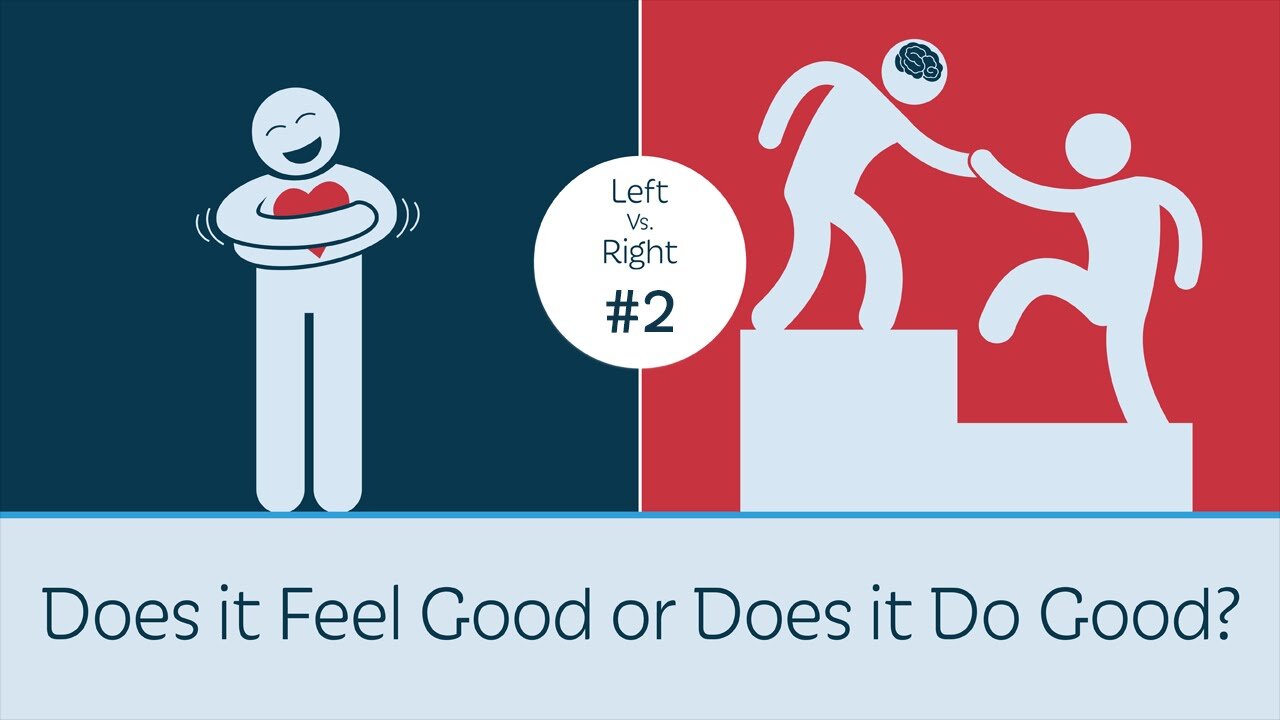Premium Only Content

A Must See Video - Does it Feel Good or Does it Do Good ? Left vs. Right #2 W0W
When setting public policy, what's more important: intentions or results? Feeling good or doing good? When it comes to being guided by the heart or by the mind, the Left and Right are very different.
A fundamental difference between Left and Right concerns how each assesses public policies. The Right asks, “Does it do good?” The Left is more likely to ask a different question.
Take the minimum wage, for example. In 1987, the New York Times editorialized against any minimum wage. The title of the editorial said it all -- “The Right Minimum Wage: $0.00.”
“There's a virtual consensus among economists,” wrote the Times editorial, “that the minimum wage is an idea whose time has passed. Raising the minimum wage by a substantial amount would price working people out of the job market…Why did the New York Times editorialize against the minimum wage? Because it asked the question: “Does it do good?”
But 27 years later, the New York Times editorial page wrote the very opposite of what it had written in 1987, and called for a major increase in the minimum wage. In that time, the Times editorial page had moved further and further left and was now preoccupied not with the question, "does it do good?" -- but with the question, "does it feel good?" And it feels good to raise poor people’s minimum wage.
A second example is affirmative action. Study after study -- and, more importantly, common sense and facts -- has shown the negative effects that race-based affirmative action has had on many black students. Lowering college admissions standards for black applicants has ensured a number of awful results.
Just to cite one, more black students fail to graduate college. Why? Because too many have been admitted to a college that demands more academic rigor than they are prepared for. Rather than attend a school that matches their academic skills, a school where they might thrive, they too often fail at the more demanding school that lowered its standards to admit them.
It's clear that supporters of race-based affirmative action ask, "Does it feel good?” rather than, “Does it do good?”
A third example is pacifism and other forms of “peace activism.”
Many people on the Left have a soft spot for pacifism -- the belief that killing another human being is always wrong. Not all leftists are pacifists, but pacifism almost always emanates from the Left, and just about all leftists support “peace activism,” “peace studies,” and whatever else contains the word “peace.”
The Right, on the other hand, while just as desirous of peace as the Left -- what conservative parent wants their child to die in battle? -- knows that pacifism and most “peace activists” increase the chances of war, not peace.
Nothing guarantees the triumph of evil like refusing to fight it. Great evil is therefore never defeated by peace activists, but by superior military might. The Allied victory in World War II is an obvious example. And violent Islamists today need to be killed before they behead, enslave, and torture more innocents.
Supporters of pacifism, peace studies, American nuclear disarmament, and American military withdrawal from countries in which it has fought do not ask, “Does it do good?" Because it almost never does good.
-
 13:19
13:19
What If Everything You Were Taught Was A Lie?
22 days agoWhere The Outrage Poison Food Jillian Michaels Receives Standing Ovation After Speech
4.32K7 -
 LIVE
LIVE
Tactical Advisor
26 minutes agoNEW Budget Glocks | Vault Room Live Stream 011
523 watching -
 16:30
16:30
SNEAKO
7 hours agoNO FRIENDS IN THE INDUSTRY.
4.77K14 -
 15:18
15:18
DeVory Darkins
21 hours ago $2.83 earnedTrump Drops NIGHTMARE Warning on Joe Biden
4.96K23 -
 36:13
36:13
The Why Files
1 month agoAlien Implants Vol. 1: Devil’s Den UFO Encounter: What Was Found Inside Terry Lovelace?
39.9K36 -
 4:23:49
4:23:49
FreshandFit
12 hours agoIsrael v Palestine Debate! Respect A Man If He Says No Or Yes To A Girl's Trip?
165K177 -
 2:05:33
2:05:33
TheSaltyCracker
14 hours agoTech Bros try to Hijack MAGA ReeEEeE Stream 12-27-24
298K514 -
 2:01:25
2:01:25
Roseanne Barr
19 hours ago $41.26 earnedJeff Dye | The Roseanne Barr Podcast #80
134K67 -
 7:32
7:32
CoachTY
17 hours ago $12.19 earnedWHALES ARE BUYING AND RETAIL IS SELLING. THIS IS WHY PEOPLE STAY BROKE!!!
124K8 -
 1:01:00
1:01:00
Talk Nerdy 2 Us
14 hours ago💻 From ransomware to global regulations, the digital battlefield is heating up!
44.4K2